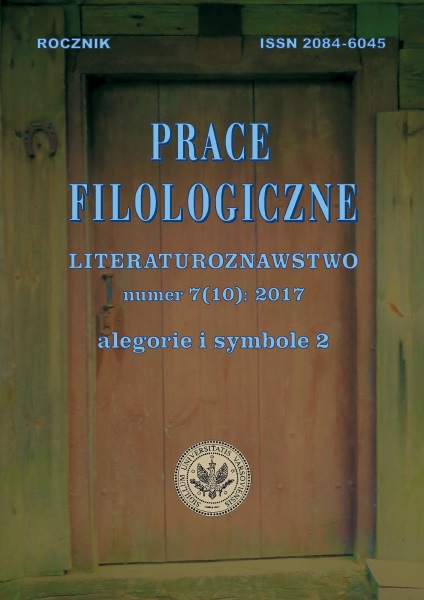Paradoksy młodopolskiej alegorii
The paradox of the Young Poland movement allegory
Author(s): Dorota KielakSubject(s): Polish Literature
Published by: Wydział Polonistyki Uniwersytetu Warszawskiego
Keywords: alegoria; alegoreza; rzeźba; powieść popularna; Młoda Polska; allegory; allegoresis; sculpture; popular novel; the Young Poland movement
Summary/Abstract: The present sketch traces the process of verifying allegory which takes place in the Young Poland prose, in which authors use the images of sculptures. The interpretation of {Pavoncello}, a story by Stefan Żeromski, {Chimera}, a novel by Tadeusz Jaroszyński and {The Angel of Death} by Kazimierz Przerwa-Tetmajer allows to put forward a thesis that the allegorical function of sculptural works of art which appear in the presented world is challenged, whereas allegory understood as the compositional principle of a work is strengthened. Verification of allegory for the benefit of allegoresis is done by challenging the ‘semiogenic’ function of allegory and at the same time by appreciating it for defining trails of interpretation and universalizing meanings. W szkicu prześledzono proces weryfikowania alegorii, dokonujący się w młodopolskiej prozie, w której autorzy posługują się wyobrażeniami rzeźbiarskimi. Interpretacja opowiadania Stefana Żeromskiego Pavoncello, powieści Tadeusza Jaroszyńskiego Chimera oraz Kazimierza Przerwy Tetmajera Anioł śmierci pozwala na postawienie tezy, że alegoryczna funkcja rzeźbiarskich dzieł sztuki, występujących w świecie przedstawionym utworów, zostaje zakwestionowana, a w zamian za to wzmocniona zostaje alegoria rozumiana jako zasada kompozycyjna dzieła. Weryfikacja alegorii na rzecz alegorezy dokonuje się poprzez zakwestionowanie znaczeniotwórczej funkcji alegorii, a jednocześnie poprzez docenienie jej jako wyznaczającej tropy interpretacyjne i uniwersalizującej sensy.
Journal: Prace Filologiczne. Literaturoznawstwo [PFLIT]
- Issue Year: 2017
- Issue No: 7 (10)
- Page Range: 279-289
- Page Count: 20
- Language: Polish

